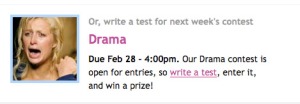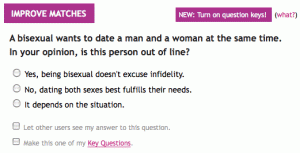
This post is neither about the Myth of Cupid and Psyche nor about the artist Pascal.
Nearly a week later, and I’m still recovering from Valentine’s Day, which apparently is also known as “the day when complete strangers can insinuate that you and whichever male friend you happen to be spending time with are a couple and then insult that male friend for not buying you a rose. ” I was unaware of this second name–this strange custom didn’t appear in college, where I’d usually either spend my Valentine’s Days buying student group fundraiser chocolates for boys that I had crushes on, so that I could make life awkward for the both of us or sneaking paper cranes into friends’ mailboxes. But one thing that’s a constant about Valentine’s Day whether in or out of the ivory tower is the way it tends to make single people feel guilty,bitter or inadequate. And then we run to dating sites (link to Sara Haskin’s “Target Women” video on the subject, which is hilarious).
Okay, I’ll stop with the snark (maybe). For one thing, the real reason why I waited nearly a week for this post is that I just figured out how to do screen captures yesterday (and wasted copious amounts of time saving all the internet ads I hate for future subtext juicing). For another, the point of this post is not the cultural phenomenon of dating sites, but the uncomfortable subtext lurking in one rather popular dating site: OK Cupid. Most people I know within my age group use OK Cupid to some capacity, myself included. As far as dating sites go, it’s generally thought to be the most “with it.” I’ve even seen it praised by commenters on Feministing for not marginalizing poly relationships and allowing for homosexuality and bisexuality (because apparently other sites have not gotten the message).
But behind its trendy facade, OK Cupid makes plenty of really uncomfortable statements and insinuations. You know, the sort of assertion that people like to pretend is edgy, but in closer examination is revealed to be the same sort of cultural messages we’ve been receiving for years. In many ways, OK Cupid is not nearly so friendly and savvy a site as it makes itself out to be.
Admittedly, it’s difficult to know where to begin. Deciding to join a dating site is full of implications that make people feel uncomfortable and question themselves that have nothing to do with the site itself. Also, there are plenty of things about the site that make me feel uncomfortable, from features that “punish” you (aka- mark you with a red light, meaning that you rarely reply to other messages) for not replying to each and every message you get (ignoring the fact that most people receive some pretty invasive messages that they may not feel comfortable replying to) to the fact that it calls you a “dirty dog” if you turn off the automatic censor. Their “about us” page only includes one woman, which would bother me less if her photo was not of a pair of disembodied legs in fishnets and her label wasn’t “office chick,” whose primary duties were “making sure Sam doesn’t go insane, writing surveys, busting spammers and never, ever letting the programmers run out of Diet Pepsi.” But then, I have a sense that many dating sites probably think they can create a dating site for both men and women with only the input of one gender (Apparently, they’ve all read/seen He’s Just Not That Into You and therefore know that women have relationship IQs of 5.). The fact is, if I just systematically pointed out everything I’ve seen on the site with disturbing subtext, I’d get a headache; and this post would become a mere rant. So, as always, I’m going to focus on a few bits and pieces that I think illustrate larger issues.

Semiotic Stereotyping
(I <3 alliteration)
OK Cupid, like pretty much anything on the net or in print, has to choose images to represent a news bite. To avoid bombarding people with giant walls of text, they try and reduce people to images as much as possible. For example, every user, as they use the site, is awarded a series of personality trait images. For example, if someone is “more compassionate” than most users, their profile has a cartoon image of a cheerful female nurse (more ambitious, by the by, is a man in a business suit with a laptop). But what’s really irked me this week is their image for their weekly quiz contest, drama. The programmers at OK Cupid decided that they could best represent this contest with an image crying, screaming woman, playing into the stereotype that women just love making big deals out of nothing and causing excess drama. You’ve never heard of a drama king, right? They must not exist. The fact that the image isn’t even commented upon and is simply plastered up there beside the word drama without explanation only makes it worse: it turns the image into a symbol.
This is a particularly insidious use of semiotics, the science of signs. Basically, semiotics looks at how we make a connection between image and meaning. For example, the little image (or the little emoticon that I used above) that we tend to think of as a “heart,” does not look anything like a human heart. Yet, in our cultural imagination, the image is inextricably intertwined with this meaning. In this example, the OK Cupid design time created an arbitrary symbolic correlation between the crying woman and drama. This plays into the at least old as Greeks (if not time) idea that women are hysteric (a word which actually comes from the Greek word for womb.), irrational creatures and tend to make ludicrous complaints. It plays into the idea that we’re always looking for drama where there isn’t any, making mountains out of molehills. Do I think it’s going to brainwash anyone who didn’t already believe this to some degree? No. But it’s obnoxious, and propagates an image of women that we constantly have to fight against and discourages women from speaking up even when it matters.
Awkward Questions

This Question is... A) Useful to choosing a date B) Not actually about bisexuality C) I Wish I Were Emma Peel. D) Oh, Look! A Book of Chaucer
The lifeblood of OK Cupid’s matching system is a series of multiple choice questions that you answer both for yourself and for your ideal match. The site’s matching algorithm then uses this information to stick you with a bunch of labels and calculate how well you will get along with other people.
Now, of course, everyone regardless of gender, sexuality, age, and relationship status has to answer the same questions, which, initially seems like a good idea. But, in my experience, this tends to lead to what can, if we use only diplomatic terms, be described as awkward situations.
My queer friends (especially those who live in neither Massachusetts nor Connecticut, and were not in California before the 2008 election) have a lot of fun answering questions about whether they wish to get married some day, and whether they believe homosexuality is a sin or not. My trans friends have dealt with similar questions. I suppose you could argue it’s not the duty of a dating site to condemn anyone’s moral judgment, no matter how bigoted, but I have to admit that I feel uncomfortable with the site normalizing homophobia and transphobia like that. Pretty much, instead of alienating a socially conservative audience, the site has decided that they’d rather pretend that homosexuality and transgenderism are things that we can debate normally and dispassionately, like marijuana usage or gun control, as if it didn’t involve debating the legitimacy of actual people. The site acts as if it is simply taking itself out of the debate by allowing “both sides” on their site. Is this really okay? Is this behavior really conducive to a safe, fun website?
Another “fun” example is the question that I posted in the image above, an image which I have entitled “questionnotaboutbisexuality.gif” because I still don’t know what bisexuality has to do with anything. The question reads, “A bisexual person wants to date a man and a woman at the same time. In your opinion, is this person out of line? A) Yes, being bisexual does not excuse infidelity. B) No, dating both sexes best fulfills their needs. C) It depends on the situation.” The question may have an “out,” a none of the above, but I’m still bamboozled as to why a question which is essentially about open relationships has to become tied up in sexual orientation. I declined to answer this question because, to me, “it depends on the situation” does not translate to, “As long as everyone is open, honest, and consenting.” Gender has nothing to do with it. Sexuality has nothing to do with it. Bringing bisexuals into the mix just plays into the bisexuals are more likely to cheat stereotype.
And I’m not even going to start on the “slavery vs. holocaust” oppression Olympics question.
In a sense, by staying out of moral debates, OK Cupid has made itself a less safe place to be.
Oh, Baby, That’s Just the Way It Is
And last, and least, the text blurb that inspired this post in the first place:
You’re choosy, not wanting to get mixed up with just anyone. Girls can get away with this kind of selectiveness for some reason. Most guys have to take whatever’s lying around, passed out.
After taking their (heteronormative) “dating persona” personality test, I decided to check out some of the other possible personas a person can have. This one comes from the female persona “The Intern,” a woman who wants casual sex, but is inordinately picky. Ladies and gentlemen, welcome to rape culture. (Oh yes, and stereotypes about how straight men just want sex and will take anything with boobs. Can’t forget those. The stereotypes, I mean, not the boobs. Though one should remember boobs too.)
This, combined with such questions in their matching algorithm which ask if no really means no are not innocent comments nor funny depictions of college party life. By including them so flippantly on their site, OK Cupid is normalizing this kind of behavior. How is this okay?
And that, my friends, is the crux of this post. Dating sites may not be designed to be moral regulators or political forces, but they are both a product of and a regulator of our culture. OK Cupid may be pretending to stay out of debates, but it’s really saying that it’s okay in our culture to discriminate based on gender and sexual orientation; it’s okay to have sex with someone without consent; it’s okay to be a person who ignores the word “no.” It’s saying that in our culture, it’s okay to chalk these things up to personal preference.
Is it?
Sometimes I think I’m a bad feminist blogger because my gut reaction to any sort of rhetorical question like that is, “I don’t know.” I don’t claim to have all the answers. So I’m going to cheat and say, “I’m here to make you think,” because I feel like a hypocrite every time I declare moral superiority because I criticize conservatives for the same thing. Though, honestly, I can’t imagine how any of this is okay or even desirable in our culture.
Nevertheless, I think it’s safe to conclude that OK Cupid is not a safe dating site, not that I think there’s one out there that currently does any better. It’s pretty clear to me that no dating site, and certainly not OK Cupid is going to make me feel like a desirable straight woman for my feminist beliefs or make me feel particularly welcomed on their corner of the internet except as a sex object. But that’s all part and parcel of internet culture, which is, of course, tied up in our own culture. I think sometimes we separate the two too readily.

Oddly enough, OK Cupid, you're not helping.



11 comments
Comments feed for this article
February 19, 2009 at 6:48 pm
Ruie
Re: Questions
I believe a good chuck of questions are user submitted, which doesn’t excuse anything but it does explain why their sensitivity to different issues are all over the map.
February 19, 2009 at 6:51 pm
Steph
True, but don’t the OKCupid people actually approve the questions?
February 19, 2009 at 7:56 pm
Allison
I went to the theater with a male friend on Valentine’s Day and we didn’t get one weird comment. I was pleased.
More on-topic, I do find that Ok Cupid is quite hard to stomach for any length of time. Especially what with the obnoxious questions invariably being the ones that have been submitted by so many people that you have to answer them several times in various versions. But I have nothing so articulate to say about it.
February 20, 2009 at 12:01 pm
Lemur
They really have a question about whether “no really means no”?? Please tell me that it’s so anyone who indicates that “rape” is their “preference” gets put in the “potential rapist” category and they don’t send that person any profiles to match up with?
Tell me that’s why they ask that f&^%ed-up question, so I can stop banging my head against my desk.
February 22, 2009 at 11:26 pm
Rob
Out of curiosity, I checked to see whether there is any way for to give feedback on the questions on OKCupid. As you may already know, they have a comments section for each question. Do you have any idea whether the people running OKCupid bother to look at the comments?
As to the moral superiority issue, maybe you can claim better understanding/grokking of a particular issue without claiming general moral superiority. Do you think that makes taking a definitive stance less problematic?
August 27, 2009 at 7:17 pm
Jenny
Love the image you used… huge fan of Cupid and Psyche!
Not so much a fan of OK Cupid… I tried it out a couple of times, and it really disturbs me that they now casually use the word “Stalker” for you to see who’s following you on the site. That should never be used lightly, as I’ve had friends who have been stalked. And this is the internet we’re talking about… the virtual mask that any creep can hide behind.
September 10, 2009 at 4:58 am
John Kabel
“Part and parcel.” Not “part and partial.”
September 10, 2009 at 7:06 am
Steph
Oops–thanks for catching that. Sometimes my fingers go too fast for my brain. *embarrassed*
January 31, 2010 at 3:42 pm
makeitheavy
Nice post, I love your use of semiotcs with the pascal. To put it bluntly, OK cupid sucks. Unless you want to meet people with the express purpose of using them, I can’t see the site doing anything for anyone.
fd
February 26, 2010 at 2:44 pm
Cedar
Oi. ….Yeah…
I kind of want to halfway disagree with you on the turning-moral-issues-into-personal-preferences question. Because questions of that ilk can be used to sort ppl out… but the site isn’t set up to do that.
I remember trying to write a question that put the shoe on the other foot–that tried to evaluate how trans-savvy a person was so that I could reject them if they were garden-variety/”well-meaning”-transphobic (because at present the questions aren’t useful because they only let me excude hater-transphobic)–and having it rejected. Of course, right? 97-99.5% of the site’s users are cis, if they don’t like or don’t get the question, it goes. And if the 80-95% of the users who are straight don’t get a question about heteronormativity (let alone the heteronormative queer folk)…
Like, the marriage and is homosexuality ok and would-you-date-a-trans (EWWW) questions all make me angry. But I’m not sure the problem is actually in the fact that they ask these questions–it’s a)the minority’s questions don’t get asked, b)what answers are allowed, and c)how questions are handled.
I’ve had multiple culturally-straight bi people assert to me that they could date a person of each gender simultaneously without it being cheating without recourse to a poly/consentual paradigm, and that their partners had no right to complain. One of these people I had the rather dire misfortune to date in HS, and if I were looking to date monogamously, I’d be displeased to have a partner who thought that. But the question forecloses the answer, ‘gender/sexuality has nothing to do with it, but yay poly.’
…
I can say “mandatory” all I like, if someone has otherwise good answers but says trans women are deceivers/trans people’s genders are invalid, they’ll still show up at the top of my list, despite the fact that you couldn’t pay me to go on a date with them.
But what if it were handled differently, such that I could simply take all people who answered x, y, or z off my match list entirely, not just bumped down a % or two? And asking trans people’s questions? (And getting to not be confronted with transphobia/homophobia questions if we say we’re trans/queer…) Then we get into–what’s the alternative? Not having those red flags? I’d rather keep someone away from me if they said that {no, safeword} didn’t always mean no. …It seems to me to be as much or more a matter of where the bar is set–and who counts as a subject under that question–than the existence of the bar.
March 19, 2010 at 7:15 am
Sarah
Loved your assessment. Especially your very in depth inclusion of social conventions and ideographs. Very nice. You are clearly an intelligent person.